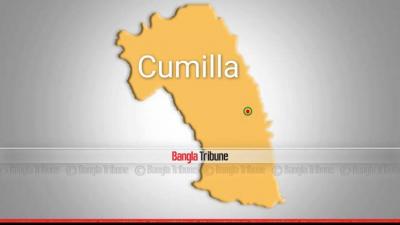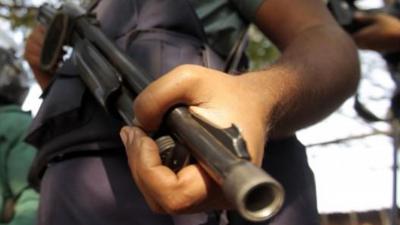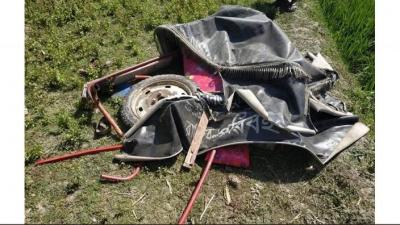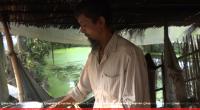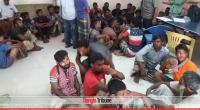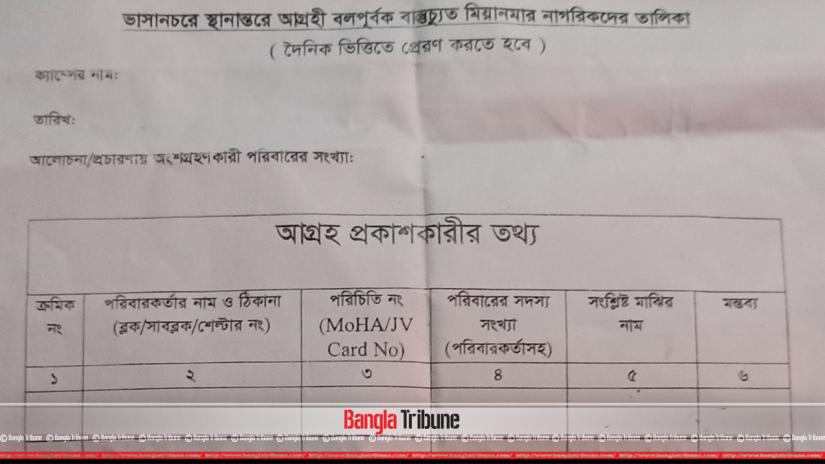 The concerned government authorities have been handed in a listed of 17 Rohingya families who are willing to move to the island of Bhashan Char from the camps at Cox’s Bazar overflowing with over 1.1 million refugees.
The concerned government authorities have been handed in a listed of 17 Rohingya families who are willing to move to the island of Bhashan Char from the camps at Cox’s Bazar overflowing with over 1.1 million refugees.
The government has long been trying to move them to the island near Hatia since the biggest influx came from Myanmar in 2017.
The endeavour, similar to the repatriation initiatives failed due to the unwillingness of the Rohingyas who are allegedly discouraged by the NGOs working with them.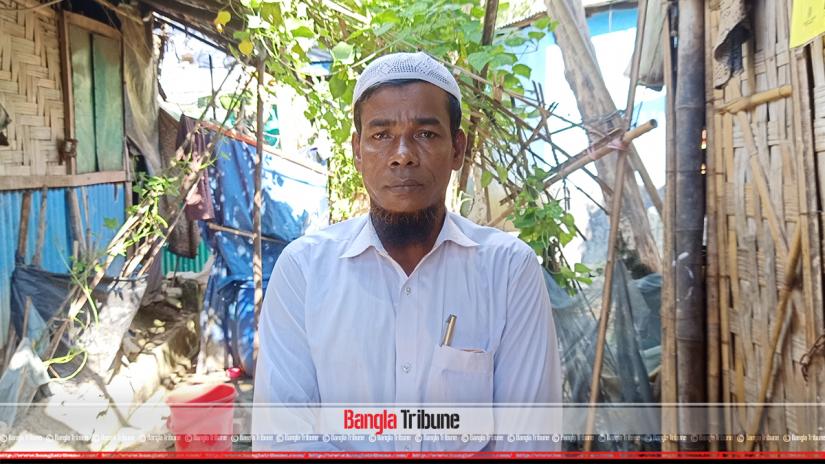 Seventeen families at the Leda camps in the south-eastern district’s Teknaf Upazila have expressed willingness to move to Bhashan Char, an employee of the Bangladesh Refugee, Relief and Repatriation office told Bangla Tribune.
Seventeen families at the Leda camps in the south-eastern district’s Teknaf Upazila have expressed willingness to move to Bhashan Char, an employee of the Bangladesh Refugee, Relief and Repatriation office told Bangla Tribune.
Speaking to Bangla Tribune on Wednesday (Oct 18), the employee, wishing to remain anonymous, said that they were now getting positive response from the Rohingyas regarding the move.
“It’s a good sign but the list is not yet final. Top government authorities have been notified,” he said and added that it still remains to be seen how long the willingness last.
Refugee, Relief and Repatriation Commissioner (RRRC) Mahbub Alam declined to make comments on how many Rohingyas have signed up, saying, “the list is being prepared and it’s an ongoing process. But it’s a good sign for Bangladesh.”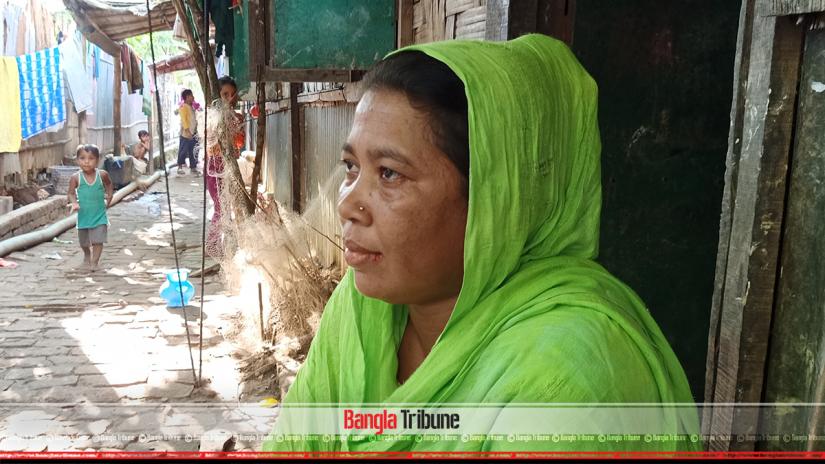 Responding to queries on whether the Rohingyas are eyeing Bhashan Char as an alternate destination to Myanmar and whether it will hinder the repatriation process, he said, “We are nor fearing anything like that. The Rohingyas understand that they can stay in Bangladesh permanently.”
Responding to queries on whether the Rohingyas are eyeing Bhashan Char as an alternate destination to Myanmar and whether it will hinder the repatriation process, he said, “We are nor fearing anything like that. The Rohingyas understand that they can stay in Bangladesh permanently.”
He added that Myanmar was also slowly becoming safer for them, and the move isn’t a permanent solution is unlikely to affect repatriation.
Fifteen Rohingya leaders on Thursday (Oct 17) met with representatives of the RRRC, International Organisation for Migration (IOM) and NGO employees regarding the move, confirmed Leda camp leader Mostafa Kamal.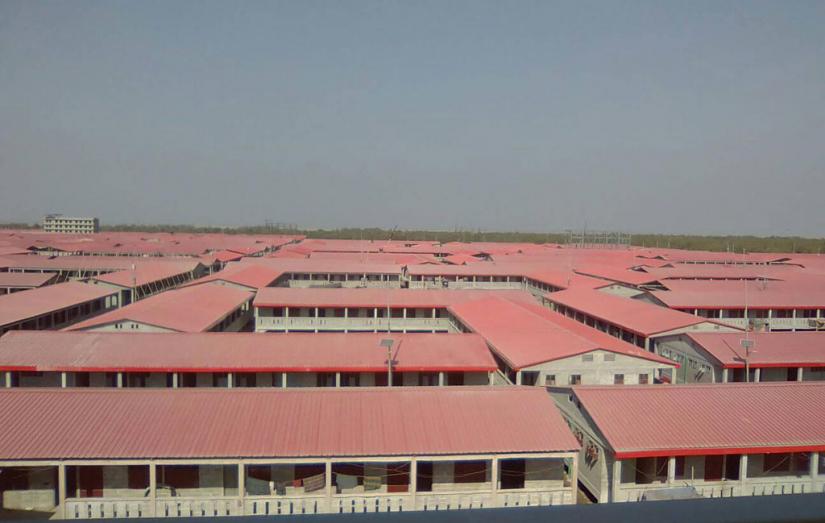 “It was said during the meeting that the government does not want to send anyone forcefully but the Rohingyas should be convinced that it’s a better option for them,” he said.
“It was said during the meeting that the government does not want to send anyone forcefully but the Rohingyas should be convinced that it’s a better option for them,” he said.
He added that refugees from two camps have expressed willingness to move and they were working so that more of them can be convinced to go back.
Nur Hossain, 50, who is willing to move said that he along with his family of four have signed up after the camp in-charge showed them pictures and videos of the houses.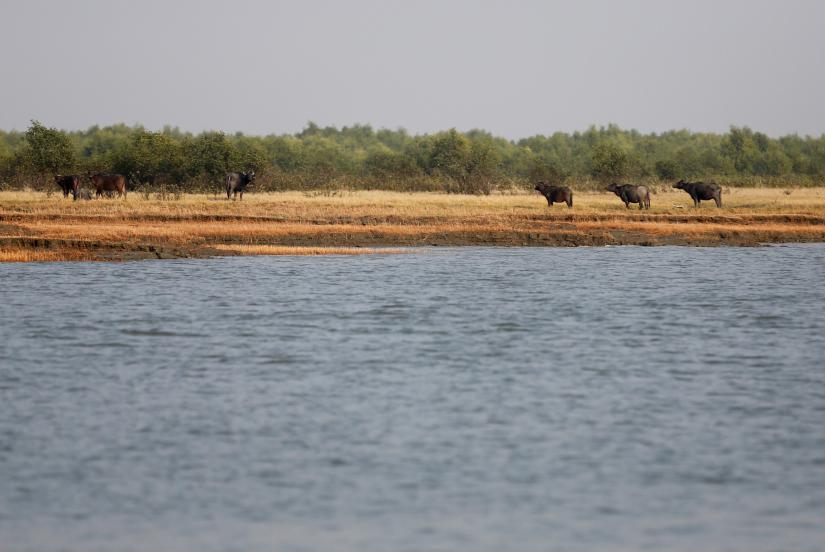 “But before moving there if we could visit the place and explain it to the other Rohingyas maybe it would be easier to convince them,” he said.
“But before moving there if we could visit the place and explain it to the other Rohingyas maybe it would be easier to convince them,” he said.
Another such refuge is 35-year-old widowed Rokeya Begum who says that she’s willing to move to Bhashan Char but not Myanmar and hence she along with her four children have agreed to move.
Teknaf Leda Development Commitee chief Mohammad Alam said that more refugees would be willing if they could be convinced of the “developed living conditions there.”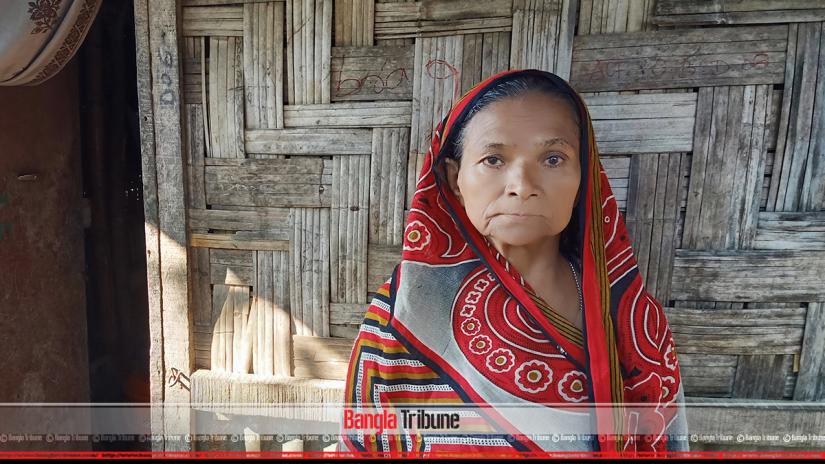 Teknaf Noyapara and Leda camp RRRC representative Abdul Hannan said that they were giving the matter utmost importance as the Rohingyas themselves expressed their willingness.
Teknaf Noyapara and Leda camp RRRC representative Abdul Hannan said that they were giving the matter utmost importance as the Rohingyas themselves expressed their willingness.
Over 700,000 Rohingyas crossed over to Bangladesh from neighbouring Myanmar following a military crackdown in Rakhine.
Refusing the grant the Rohingyas citizenship, the Myanmar army carried out mass killings, rapes and burned down settlements as part of an ethnic cleansing, driving out thousands from their homeland.
Bangladesh is currently sheltering over 1.1 million of the refugees in the cluttered camps and with two failed repatriation initiatives, no immediate solution seems to be on the horizon.
 Country
Country
30870 hour(s) 32 minute(s) ago ;
Morning 01:26 ; Thursday ; Apr 25, 2024
‘17 Rohingya families willing to move to Bhashan Char’
Send
Abdur Rahman, Teknaf
Published : 09:40, Oct 20, 2019 | Updated : 09:40, Oct 20, 2019
Published : 09:40, Oct 20, 2019 | Updated : 09:40, Oct 20, 2019
0 ...0 ...
/st/
Topics: Top Stories
- KOICA donates medical supplies to BSMMU
- 5 more flights to take back British nationals to London
- Covid19: Rajarbagh, Mohammadpur worst affected
- Momen joins UN solidarity song over COVID-19 combat
- Covid-19: OIC to hold special meeting
- WFP begins food distribution in Cox’s Bazar
- WFP begins food distribution in Cox’s Bazar
- 290 return home to Australia
- Third charter flight for US citizens to return home
- Dhaka proposes to postpone D8 Summit
Unauthorized use of news, image, information, etc published by Bangla Tribune is punishable by copyright law. Appropriate legal steps will be taken by the management against any person or body that infringes those laws.
Bangla Tribune is one of the most revered online newspapers in Bangladesh, due to its reputation of neutral coverage and incisive analysis.
F R Tower, 8/C Panthapath, Shukrabad, Dhaka-1207 | Phone: 58151324; 58151326, Fax: 58151329 | Mob: 01730794527, 01730794528

